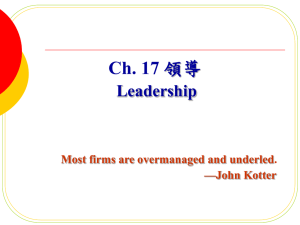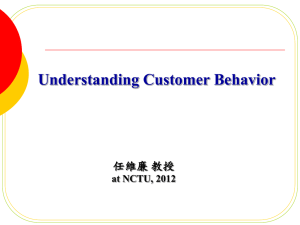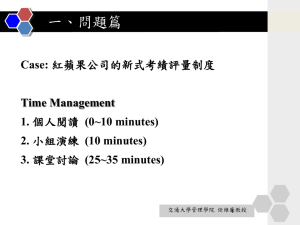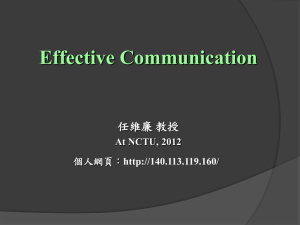Ch. 13,14 組織行為( Organizational Behavior)
advertisement
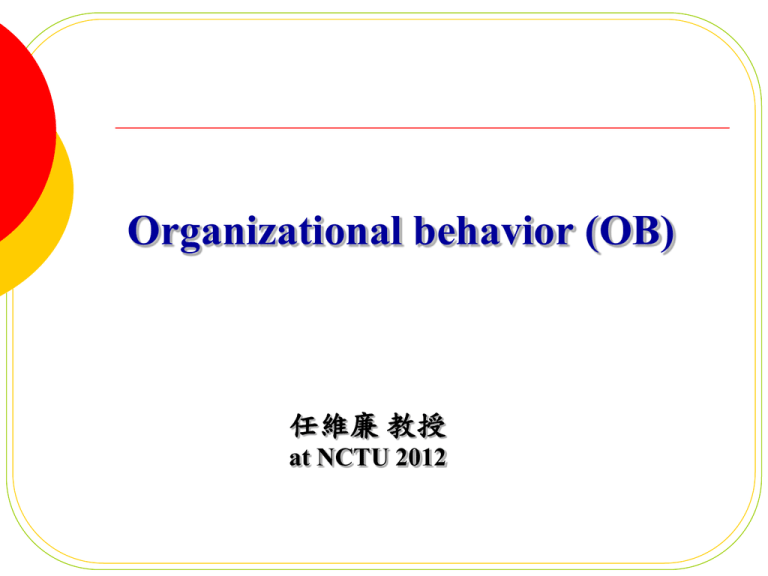
Organizational behavior (OB) 任維廉 教授 at NCTU 2012 綱要 Organizational behavior (OB) 1. Individual behavior: attitudes, personality, perception, learning 2. Group behavior: group decision making, conflict management, team learning 22 交通大學管理學院 任維廉教授 1. Individual behavior 1.1 attitudes 1.2 personality 1.3 perception 1.4 learning 3 交通大學管理學院 任維廉教授 Organization as Iceberg OB: the study of the actions of people at work. 4 交通大學管理學院 任維廉教授 1.1 Attitudes and Consistency Attitude surveys: surveys that elicit responses from employees through questions about how they feel about their jobs, work groups, supervisors, or the organization. Cognitive dissonance: 認知失調理論:若態度與行為存 在不一致情形時,則人們會透過態度或行為的改變, 或經由對該不一致性的合理解釋,使之趨於一致。 管理意涵:若需要員工從事部份(重要性)認知失調 的工作時,則管理者也許可將造成失調的原因指向競 爭者、顧客或其他外部因素(控制性),也可提供員 工想要的激勵(補償)來減低失調感。 5 交通大學管理學院 任維廉教授 Job Satisfaction 員工滿意度與生產力相關大。 快樂的員工有生產力? 員工滿意度與離職相關大。 但還有其他影響離職的因素?特別是對高績效的員工 有滿意的員工才有滿意的顧客? 非第一線員工適用嗎? 對工作、公司做態度調查可依工作團隊、部門、分公 司、整個公司計算平均得分。 得高分的部門通常績效好; 表現差的單位,在問卷結果可看出問題徵兆。 6 交通大學管理學院 任維廉教授 服務利潤鏈 工作環境的設計 工作設計 員工的評選與發展 獎勵表揚員工 顧客服務的工具 服務顧客 設計及提 的結果 供服務以 滿足目標 顧客的需 求 留住顧客 再光顧 介紹其他顧客 7 交通大學管理學院 任維廉教授 Sample Employee Attitude Survey Here are some sample statements from an employee attitude survey: I have ample opportunities to use my skills/abilities in my job. My manager has a good relationship with my work group. My organization provides me professional development opportunities. I am told if I’m doing good work or not. I feel safe in my work environment. My organization is a great place to work. 8 交通大學管理學院 任維廉教授 工作滿意度-採購部門 採購部門上司 採購部門之工作滿足 採購部門下屬 工作內容 4.5 4 升遷 上司 3.5 3 2.5 工作夥伴 工作環境 工作待遇 工作內容 上司 工作環境 工作待遇 工作夥伴 上司 3.46 3.75 4.00 3.63 3.81 4.00 部屬 3.71 3.93 3.89 3.50 4.06 3.50 交通大學管理學院 任維廉教授 升遷 9 Perceived organizational support Perceived organizational support : employees’ general belief that their organization values their contribution and cares about their well-being. 若知覺組織支持高,則工作滿意度高、離職率 低。 10 交通大學管理學院 任維廉教授 1.1 Attitudes 之管理意涵 雇用樂觀、友善的員工,灌輸顧客至上的理念 ,獎賞服務績優的員工。 定期問卷調查,了解員工想法,及早發現潛在 問題,以便預作準備。 增加工作挑戰性及趣味,提供適當獎酬,創造 支持性的工作條件及同事。 11 交通大學管理學院 任維廉教授 1.2 Personality Personality The unique combination of emotional, thought, and behavioral patterns that affect how a person reacts to situations and interacts with others. 12 交通大學管理學院 任維廉教授 MBTI Myers-Briggs Type Indicator 2 * 2 * 2 * 2 = 16 types: Social interaction: Extrovert or Introvert Preferences for gathering data: Sensing or Intuitive Preferences for decision making: Feeling or Thinking Style of making decisions: Perceptive or Judgmental e.g. Apple, AT&T, GE, 3M…… 13 交通大學管理學院 任維廉教授 Examples of MBTI® Personality Types Type Description I-S-F-P (introversion, sensing, feeling, perceiving) Sensitive, kind, modest, shy and quietly friendly. Such people strongly dislike disagreements and will avoid them. They are loyal followers and quite often are relaxed about getting things done. E-N-T-J (extraversion, intuition, thinking, judging) Warm, friendly, candid, and decisive; also skilled in anything that requires reasoning and intelligent talk, but may sometimes overestimate what they are capable of doing. 14 交通大學管理學院 任維廉教授 Big Five Model personality trait model that includes: 1. extraversion (外向), 2. agreeableness (親和), 3. conscientiousness ( 勤勉審慎) , 4. emotional stability (情緒穩定), 5. openness to experience (開放). conscientiousness 和工作績效相關大:專業、警察、管 理者、銷售員、技工, openness 和工作績效相關大:管理者、銷售員 中國人較多 conscientiousness, 美國人較多 agreeableness 15 交通大學管理學院 任維廉教授 Locus of Control Internal : 內控,相信他們能控制自己的命運 External: 外控:認為自己只是命運的棋子,很多成 敗都歸因於運氣或機會:他控,機控。他們工作滿意 度較低,和同仁較疏離,較不會專心於工作。 西方人普遍相信他們能支配環境。中東國家人很多深 信命運早已註定。英國、加拿大內控型勞工較多,沙 烏地阿拉伯、伊朗內控型勞工較少。 16 交通大學管理學院 任維廉教授 Type A / B Personality Type A Personality A型人格,經常將時限加在自己身上承受較高壓力 Type B Personality B型人格,不會想達成更多成就,較能放鬆而不感 到愧疚。 17 交通大學管理學院 任維廉教授 Emotional Intelligence (EI) EI: the ability to notice and to manage emotional cues and information. 頂尖工程師除了要有良好技術技能,更重要的 是擁有好的社會能力。 表現傑出的空軍新兵多有較高的情緒智商。 18 交通大學管理學院 任維廉教授 Holland’s Personality-Job Fit Type Personality Characteristics Sample Occupations Shy, genuine, persistent, Mechanic, drill press stable, conforming, practical operator, assembly-line activities that require skill, strength, and coordination. worker, farmer Analytical, original, curious, Biologist, economist, Investigative. Prefers independent mathematician, news activities involving thinking, organizing, and understanding. reporter Social worker, teacher, Social. Prefers activities that Sociable, friendly, counselor, clinical involve helping and developing cooperative, understanding others. psychologist Accountant, corporate Conventional. Prefers rule- Conforming, efficient, practical, unimaginative, manager, bank teller, file regulated, orderly, and unambiguous activities. inflexible clerk Lawyer, real estate agent, Enterprising. Prefers verbal Self-confident, ambitious, public relations specialist, activities that offer opportunities energetic, domineering to influence others and attain small business manager Realistic. Prefers physical power. Artistic. Prefers ambiguous and unsystematic activities that allow creative expression. Imaginative, disorderly, idealistic, emotional, impractical Painter, musician, writer, interior, decorator 19 交通大學管理學院 任維廉教授 擬動物化人格特質 Role Characteristic Percentage 老虎 支配,積極自信、競爭力強權威領導者 15% 孔雀 表達,辯才無礙、熱情幽默的社交高手 15% 無尾熊 耐心,敦厚隨和的聆聽者 20% 貓頭鷹 精確,條理分明、內斂的完美主義者 20% 變色龍 整合,適應力強、彈性靈活的百變高手 30% 工作態度大調查 (天下,2004): 台灣 6年級變色龍 41.5% vs. 大陸 70後小老虎 34.3% 20 交通大學管理學院 任維廉教授 我國公務員屬性 八爪魚近半,老虎最少 (2010) Role 老虎 海豚 企鵝 蜜蜂 八爪魚 Characteristic 勇敢,挑戰,積極 熱情,分享,樂觀 耐心,和諧,合作 品質,程序,分工 整合,周延,彈性 Percentage 7.56 % 9.90 % 13.54 % 24.53 % 44.47 % 與國外相較,台灣的地方公務人員雖然八面玲瓏,但較 欠缺主動性格。 21 交通大學管理學院 任維廉教授 1.2 Personality 之管理意涵 管理者應審慎考慮人格特質與職位的配適性,較能 甄選到績效高且滿意度高的員工。如社交型的人, 應從事和人有關的工作。 管理者需知道員工會有不同作法:解決問題、做決 策、同事互動。有些人不習慣快速決策,有些人堅 持必須蒐集足夠資訊後,才開始處理問題。 外控者工作滿意度較低,較不願對自己工作負責。 血型,星象,Match.com, 都太簡化了。 22 交通大學管理學院 任維廉教授 1.3 Perception Perception: a process by which we give meaning to our environment by organizing and interpreting sensory impressions. C 助理每次在做重要決策時,總是要考慮好幾天。 主管會怎麼想? A:她深思熟慮,仔細而謹慎。 B:她做事步調慢,沒組織,不敢做決定。 不同人對相同事情為何會有不同知覺? 1. 知覺主體,2. 目標事物,3. 發生時的情境。 23 交通大學管理學院 任維廉教授 請問你看到什麼? 24 交通大學管理學院 任維廉教授 請問你看到什麼? 25 交通大學管理學院 任維廉教授 How We Perceive People Attribution Theory: how the actions of individuals are perceived by others depends on what meaning (causation) we attribute to a given behavior. Internally caused behavior: under the individual’s control Externally caused behavior: due to outside factors 26 交通大學管理學院 任維廉教授 How We Perceive People (cont.) Fundamental attribution error the tendency to underestimate the influence of external factors and to overestimate the influence of internal or personal factors. e.g. 銷售經理易將部屬業績的滑落,歸咎於他不努力 ,而非競爭對手推出更新產品所造成。 Self-serving bias the tendency of individuals to attribute their successes to internal factors while blaming personal failures on external factors. 27 交通大學管理學院 任維廉教授 Shortcuts Used in Judging Others Assumed similarity: the assumption that others are like oneself. e.g. 我想在工作中接受更多挑戰、承擔責任,你為何不 呢? Stereotyping: judging a person on the basis of one’s perception of a group to which he or she belongs. e.g. “已婚員工比未婚者更穩定”。911事件後,美國的 回教徒生活改變了。 Halo effect - a general impression of an individual based on a single characteristic. e.g. 以教學熱忱來對老師做整體評價。 28 交通大學管理學院 任維廉教授 1.3 Perception 之管理意涵 員工對很多事情的反應,常常不是根據事實,而是自 己的知覺。e.g. 覺得考績不公平,薪水很低。 員工依據他們看到的事物拼湊起來,做出解釋。故曲 解、誤會是很難避免的。 管理者應關注員工對工作、對公司管理方式的知覺。 瞭解與尊重多元化(性別,年齡,宗教……), 認真體會別人的經驗、感受、想法。每個人都是無價 之寶!Valuing Diversity! 和而不同 (vs. 比而不周)。 29 交通大學管理學院 任維廉教授 1.4 Learning Learning: any relatively permanent change in behavior that occurs as a result of experience. Theories of learning: Operant conditioning Social learning 30 交通大學管理學院 任維廉教授 Operant Conditioning Operant conditioning: a theory of learning that says behavior is a function of its consequences Operant behavior: voluntary or learned behaviors Behaviors are learned by making rewards contingent to behaviors. Behavior that is rewarded (positively reinforced) is likely to be repeated. Behavior that is punished or ignored is less likely to be repeated. 31 交通大學管理學院 任維廉教授 Social Learning Social learning theory: a theory of learning that says people can learn through observation and direct experience. Attentional: the attractiveness or similarity of the model Retention: how well the model can be recalled Motor reproduction: the reproducibility of the model’s actions Reinforcement: the rewards associated with learning the model behavior 32 交通大學管理學院 任維廉教授 Shaping: A Managerial Tool Shaping behavior: the process of guiding learning in graduated steps using reinforcement or lack of reinforcement. Shaping methods: Positive reinforcement: rewarding desired behaviors Negative reinforcement: removing an unpleasant consequence once the desired behavior is exhibited Punishment: penalizing an undesired behavior Extinction: eliminating a reinforcement for an undesired behavior 33 交通大學管理學院 任維廉教授 1.4 Learning 之管理意涵 員工會在工作中學習,重點是由他們任意學 習,還是管理者透過獎酬來影響他們的學習 若績效低的員工也獲得升遷或加薪,則他們 實在沒動機要提升績效。而且原本績效高的 員工學會了什麼? 員工會效法上司的行為,故主管怎能一再遲 到、公器私用? 34 交通大學管理學院 任維廉教授 Terms to Know Organizational behavior Job satisfaction Attitudes Perceived organizational support Personality Big Five Model Locus of control 35
